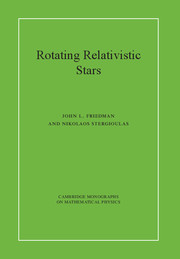Book contents
- Frontmatter
- Dedication
- Contents
- Preface
- List of symbols
- Conventions, notation, and mathematical preliminaries
- 1 Stationary, axisymmetric equilibria
- 2 3+1 split, action, Lagrangian, and Hamiltonian formalisms
- 3 Asymptotics, virial identities, and nonaxisymmetric equilibria
- 4 Numerical schemes
- 5 Equilibrium models
- 6 Approximation methods for equilibria
- 7 Perturbation theory of relativistic fluids
- 8 Quasinormal modes
- 9 Stellar stability
- 10 Nonlinear dynamics of rotating relativistic stars
- Appendix A Lie derivatives, forms, densities, and integration
- Appendix B The Newtonian limit of the two-potential formalism
- Bibliography
- Index
Preface
Published online by Cambridge University Press: 05 July 2013
- Frontmatter
- Dedication
- Contents
- Preface
- List of symbols
- Conventions, notation, and mathematical preliminaries
- 1 Stationary, axisymmetric equilibria
- 2 3+1 split, action, Lagrangian, and Hamiltonian formalisms
- 3 Asymptotics, virial identities, and nonaxisymmetric equilibria
- 4 Numerical schemes
- 5 Equilibrium models
- 6 Approximation methods for equilibria
- 7 Perturbation theory of relativistic fluids
- 8 Quasinormal modes
- 9 Stellar stability
- 10 Nonlinear dynamics of rotating relativistic stars
- Appendix A Lie derivatives, forms, densities, and integration
- Appendix B The Newtonian limit of the two-potential formalism
- Bibliography
- Index
Summary
The masses of neutron stars are limited by an instability to collapse, and an instability driven by gravitational waves may limit their spin. Their oscillations are relevant to X-ray observations of accreting binaries and to gravitational wave observations of neutron stars formed during the coalescence of double neutron-star systems. This volume pulls together more than 40 years of research to provide graduate students and researchers in astrophysics, gravitational physics, and astronomy with a self-contained treatment of the structure, stability, and oscillations of rotating relativistic stars. Numerical and analytic work are both essential to the subject, and their interplay is emphasized in our treatment.
The book is intended for more than one audience: Readers who need to work through mathematical details of stellar perturbations and stability theory will find them here, in derivations and proofs of principal results. More commonly, a reader working in relativistic astrophysics will want the principal results of the theory but will need only a few of the derivations. The text is also designed to provide a coherent treatment for this second audience, with an exposition of the results preceding the more mathematical derivations. Although our primary concern is with rotating stars, we begin our discussion of oscillations and stability with spherical stars for completeness and to make the presentation accessible to readers with no previous knowledge of relativistic perturbation theory.
- Type
- Chapter
- Information
- Rotating Relativistic Stars , pp. xv - xviPublisher: Cambridge University PressPrint publication year: 2013



